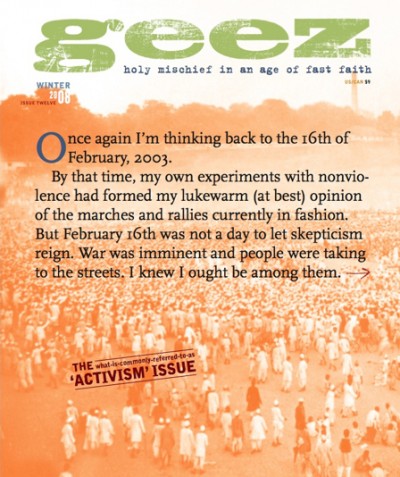Prayerful, partisan, pulpiteer activism
“As a Christian, you cannot support Barack Obama or Hillary Clinton.”
That statement, though you may disagree with it, is not a big shocker in the U.S. Such expressions of staunch evangelical-Republican allegiance are common. But it was those very words that launched a media flurry and legal kerfuffle around Gus Booth, a clean-cut, charismatic preacher man from rural northwestern Minnesota.
With one controversial sermon to his congregation in Warroad, Minnesota last June, Booth transformed himself from down-home preacher to religio-political activist. In the sermon, Booth spoke on the importance of voting and electing “godly leaders.” Then he told members of his congregation who God wanted them to vote for on November 4.
“As a Christian, you cannot support Barack Obama or Hillary Clinton.”
That statement, though you may disagree with it, is not a big shocker in the U.S. Such expressions of staunch evangelical-Republican allegiance are common. But it was those very words that launched a media flurry and legal kerfuffle around Gus Booth, a clean-cut, charismatic preacher man from rural northwestern Minnesota.
With one controversial sermon to his congregation in Warroad, Minnesota last June, Booth transformed himself from down-home preacher to religio-political activist. In the sermon, Booth spoke on the importance of voting and electing “godly leaders.” Then he told members of his congregation who God wanted them to vote for on November 4.
By openly supporting one candidate over another from behind his pulpit, Booth had violated the federal tax code which states that no tax-exempt organization, such as a church, may support partisan politics. Booth believes this tax code violates his constitutional right to free speech.
Sitting in the pews of Warroad Community Church that Sunday last June (as a reporter for the local newspaper, the Warroad Pioneer), I saw no sign of trouble. The sermon seemed to go over well with parishioners. But trouble was exactly what Booth had in mind. He intended to out himself to the IRS.
What followed was a blur of legal representations, Fox News interviews, accusations, heated blogging and careful organizing. Four months later, 33 other pastors joined Booth in Pulpit Freedom Sunday, an event organized by the Alliance Defense Fund, a “legal alliance that defends the right to hear and speak the Truth.” During Pulpit Freedom Sunday, pastors preached partisan politics to their congregations as a protest of the tax code. The Alliance Defense Fund is now representing Booth and the 33 other pastors in their legal dealings with the IRS.
“God doesn’t want us to censor ourselves,” Booth told me in a recent interview. “I can tell a man not to have an affair, but I can’t tell him how he should vote in an election? It’s ridiculous that somehow the voting booth is more private than the bedroom.”
Never one to censor himself, Booth told me what he thinks of Christians who choose, on principle, to opt out of the American political frenzy altogether: “I would say that their actions are misguided and ignorant,” he said. “I would prove to them how they are wrong… . To opt out of the system is totally unbiblical.”
Controversial though he may be, Booth is just as committed as many other activists, if not more. Although evangelicals are not known for civil disobedience, Booth doesn’t shy away from breaking the law for a cause. “I believe I am being Biblically and constitutionally obedient,” he said, “but disobedient to the IRS. I’m being obediently disobedient.”
His newfound role as political activist flows out of his convictions. “All Christians should be activists,” he said. “Being a Christian isn’t about just believing, it’s about doing what you believe. Jesus is the ultimate activist, he was so much an activist that he was killed for it.”
With President-elect Obama headed to the White House, where does that leave this Republican preacher? “The day after the election, I took my family out for a celebratory dinner,” he said. “We were celebrating the fact that we were one day closer to when Barack Obama wouldn’t be president.
“I have no personal issue with the man himself,” Booth told me, “I’d be his friend, and ask him to watch my kids, but I can’t support the policies he stands for. I’ll continue to try and effect legislation [and] pray for his repentance.”
Emily Mekash is a Geez intern. She is originally from Roseau, Minnesota, 32 kilometres west of Warroad. Mekash worked two summers as a reporter for the Warroad Pioneer.



Sorry, comments are closed.